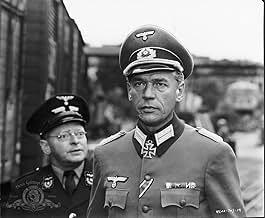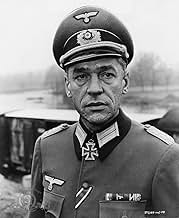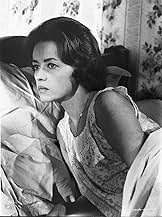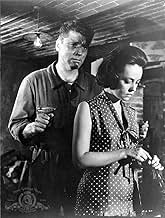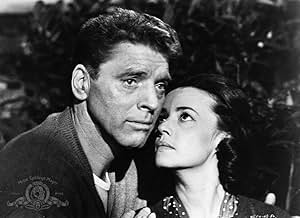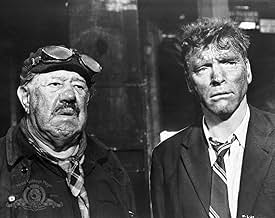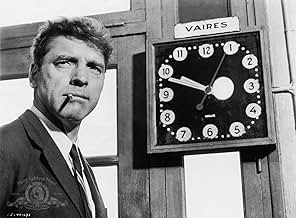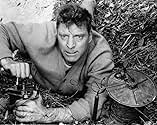En 1944, un colonel allemand charge un train de trésors de l'art français pour les envoyer en Allemagne. La Résistance, mise au courant de l'opération, va faire tout son possible pour arrête... Tout lireEn 1944, un colonel allemand charge un train de trésors de l'art français pour les envoyer en Allemagne. La Résistance, mise au courant de l'opération, va faire tout son possible pour arrêter le transfert sans endommager la cargaison.En 1944, un colonel allemand charge un train de trésors de l'art français pour les envoyer en Allemagne. La Résistance, mise au courant de l'opération, va faire tout son possible pour arrêter le transfert sans endommager la cargaison.
- Réalisation
- Scénario
- Casting principal
- Nommé pour 1 Oscar
- 1 victoire et 3 nominations au total
- Didont
- (as Albert Remy)
- General Von Lubitz
- (as Richard Munch)
- Sergeant Schwartz
- (as Donal O'Brien)
- Pilzer
- (as Art Brauss)
- Major
- (as Jean-Claude Berco)
Avis à la une
Seeing 'The Train' two days ago, what instantly came to my mind after watching was "wow!" Like most people here, to me this was a pretty exceptional film that really packs a punch in a way that not many films of its year, decade or even genre at this point of film history did. Truly powerful work that took risks and pulls no punches in a way that still has the ability to shock, no trivialising or sugar-coating here. Quite the opposite. As far as WWII films go, it is one of the best and despite being highly praised deservedly more people should know about it, it is really quite something and unlike a lot of films personally seen.
Maybe 'The Train' runs a little too long by about 15 minutes or so, which occasionally (emphasis on that word) affects the pace.
On occasions too early on, for my tastes Maurice Jarre's music score jarred a bit and like it belonged more in a comedy.
Conversely, there are so many strengths (which is actually pretty much everything else) and everything else is executed flawlessly. 'The Train' is quite masterful visually, the photography is full of atmosphere and played a huge part in making the train itself like its own character. Have never seen a train so cleverly, intimately and powerfully used. The French locations are incredibly well utilised, some of the best use of French locations for any film seen in a long time from personal view. On a technical level, the action with the train is enough to make the jaw drop today. Frankenheimer's direction is hugely accomplished and not since 'The Big Parade' as far as recent film viewings go has there been direction for any film that was this visually flawless. Most of Jarre's score works very well, when it becomes more subtle and more harmonious with the atmosphere it is quite hauntingly unsettling.
Script is very intelligent and thought-provoking, taut enough while allowing breathing space yet not rambling. The story is hugely compelling, is very intense especially the exciting action with the train and is emotionally powerful. Found myself quite moved and shocked at how much the more uncompromising moments (and there are many) wrenched the gut, haven't seen an ending this poetic in a while either. The characters are well defined and interesting. There are great performances from all, with Lancaster superb in one of his best performances. He tells so much with his face and eyes and could tell he meant every word with his line delivery, he is especially good in the last twenty minutes where words are few but one intensely feels his hurt and anger. Scofield has seldom been nastier or at times even frightening. Jeanne Moreau's role isn't huge but she is sympathetic in it and an atypically cast Michel Simon is very telling in his.
In summary, exceptional and one of the best WWII films. 9/10
Burt Lancaster stars as a French train engineer that has to transport the shipment. At first is not a easy task, but he succeeds in the end. Meanwhile he becomes friend with a hotel owner played by French actress Jeanne Moreau (that passed away last year). And the other members of the cast are fine. Paul Scofield as a German general is great (and Scofield also starred in other great movies after this), and it was a treat seeing French comedian Michel Simon in a war movie (just like Bourvil in THE LONGEST DAY).
This movie had great direction by John Frankenheimer, great performances by all the actors, and also great photography in Black and White. Although a bit dragged in some places, it was still great to watch! And as a fan of the history from 1850 until these days, I liked the movie for his accuracy and his action scenes.
The centerpiece of the movie is a clash of wills between Von Waldheim, a cultured but iron-backed Nazi colonel (well-played by Paul Scofield) charged with getting the stolen artworks to Germany, and a taciturn railway troubleshooter named Labiche (Burt Lancaster). Von Waldheim first enlists Labiche as 'insurance' against any monkey business during the train's journey. Labiche, though, happens to have Resistance connections and, with serious reservations, is drawn into a desperate, improvised plot to stop the train, preferably without damaging the precious artifacts inside.
Although easily enjoyed as a straight action flick, what gives the film weight is the supporting story, in which Labiche at first argues against wasting precious lives on a few crates of paintings he's never seen, then gradually comes round as he begins to understand that the Nazis are effectively carrying off a large piece of the heart of France. Beautiful deep-focus black and white photography, and solid supporting performances by a mostly French cast (of which Jeanne Moreau may be the best-known), convincingly evoke the bleak misery of the Occupation. John Frankenheimer's economical direction manages to present highly-charged action scenes without glossing over the human cost, as Von Waldheim exacts savage reprisals against escalating efforts to hinder the train's passage.
Lancaster, who performed his own stunts, is excellent, furiously athletic as he slides down ladders, leaps onto moving locomotives, and charges over ridges and fields in pursuit of the train. At the same time, he manages to effectively bring a subtle authenticity to his portrayal of the weary, fatalistic railwayman.
Finally, the action set-pieces are nothing short of stunning, and include the train's mad dash through an Allied carpet-bombing attack, a strafing raid on a speeding locomotive, and several wrecks and derailments, all staged full-scale with period equipment donated by the French national railway. Well worth obtaining on DVD, the film may be hard to find on broadcast television these days.
Burt Lancaster is Labiche, a French station manager who becomes entangled in efforts to prevent German Colonel Von Waldheim (Scofield) from shipping hundreds of classic pieces of artwork out of Paris before the Allies re-take the city.
John Frankenheimer has done an excellent job putting every aspect of great storytelling together. The most essential part is the characters. Lancaster is absolutely great as Labiche. While the French want him to simply delay the train, Labiche is always more concerned about the human cost. Eventually, so many men are killed in the attempt to delay the train that he takes it upon himself to save the artwork so they did not die in vain. On the opposite side, Scofield makes a very believable, maniacal officer. He is purely obsessed by art. He's not your typical Hollywood "Nazi" officer; here, his one goal is not eradication of the Jews or whatnot - it's to steal millions of dollars worth of paintings for personal gain.
The French are played, for the most part, by young native French actors. Michel Simon plays a grizzled old engineer who tries to take matters into his own hands, at first, when Labiche won't aide the cause. Albert Remy (IS PARIS BURNING?) and Charles Millot (THE BATTLE OF NERETVA) are Labiche's resistance sidekicks, both passionate in their rather minor roles. Jeanne Moreau (THE VICTORS) makes a pretty big impression as a hotel owner who gets caught up the fight and elects to help Labiche, even though it will hurt her business and put her life in danger.
In support, the cast is made up of some very fine young actors who would become mainstream faces in later European war movies. Wolfgang Preiss (THE LONGEST DAY) makes an impression as the German Major commanding a rail yard, who is just simply trying to keep his facility running well and doesn't want to deal with Von Waldheim. The great Richard Munch (PATTON) has one strong scene as a German general, who knows the front line battle is more important than Von Waldheim's art. Howard Vernon (FROM HELL TO VICTORY) is the German captain with glasses in charge of the train; Donald O'Brien (DEADLY MISSION) is a very mean-looking Sergeant keeping Lancaster and Remy in check; and Arthur Brauss plays the German Captain interrogating the stationmaster.
The second essential portion of the story goes to the purely technical side of the production. First of all, there are some truly spectacular action sequences. Most of them were done with real locomotives, on life-size sets with authentic explosions. One huge, three-way head-on-collision is awe-striking and must have marvelous to see on the big screen. Lancaster performs all of his own stunts; jumping from control towers, running and catching moving trains - all, one would think, would be difficult for a man of 51 - but Lancaster doesn't show a bit of strain. A good deal of the action centers around simply moving trains and equipment through railyards, and it's all portrayed with acute attention to authenticity and detail.
At key moments, Frankenheimer uses his typical unorthodox filming technique to give the action a new perspective. The camera zooms in on every day objects, which actually have key importance at that one moment. He follows Labiche down a hallway with a handheld camera simply because it's the best way of showing how he gets to where he's going. All of this is trademark Frankenheimer direction, and it gives the film a sharp, cutting edge to its already awesome plot. Sincerely, standard direction with all of the same elements would really lessen the impact of the punch every other element packs.
A few side notes: the scenery is great; each town, village set piece, actual location or open countryside looks just like 1944 France. Maurice Jarre's rousing music score is great and is quickly becoming one of my favorite war movie themes, ranking with the works of Jerry Goldsmith, Ennio Morricone, Elmer Bernstein and John Williams.
I saw this movie on Turner Classic Movies, letterboxed about 1.66:1. This is apparently a transfer directly from the DVD. The print is excellent: the black and white image is sharp, the sound is clear and appropriately loud; and there is hardly a scratch or speckle to be seen. The DVD is probably worth buying for the commentary track it holds, but I have not yet viewed the disc.
THE TRAIN is an instant classic from the Golden Age of cinema, with every element working perfectly.
RATING: 10/10
John Frankenheimer directs in stark black and white, and the film has his trademarks all over it -- kinetic compositions, rapid-fire editing, ragged documentary look and feel. Paul Scofield also stars as the obsessed Nazi and Jeanne Moreau has a role as a French woman who reluctantly aids and abets Lancaster. The sheer physical production is astounding; in the days before CGI would have done everything for them, Frankenheimer and company staged massive set pieces involving bombed railroad yards, crashing trains, you name it. I can only imagine how much pressure the special effects guys were under to get everything right the first time because re-staging it for a second try would have been a bear.
"The Train" brought Franklin Coen and Frank Davis an Academy Award nomination for Best Original Story and Screenplay at the 1965 Oscars.
Grade: A-
Le saviez-vous
- AnecdotesBurt Lancaster performed all his own stunts in this movie. Albert Rémy also got into the act by performing the stunt of uncoupling the engine from the paintings train on a real moving train.
- GaffesWhen the German officer in the train thinks they've arrived in Germany, he takes a look at his map and we see Strasbourg (Alsace, France), the France-Germany border and Baaden-Baaden (Germany). During German occupation of France, Alsace and Strasbourg were annexed to the German Reich, i.e. this German military map should have shown a different border (100 km West) and Strasbourg should have been in Germany.
- Citations
Colonel von Waldheim: Labiche! Here's your prize, Labiche. Some of the greatest paintings in the world. Does it please you, Labiche? Give you a sense of excitement in just being near them? A painting means as much to you as a string of pearls to an ape. You won by sheer luck: you stopped me without knowing what you were doing, or why. You are nothing, Labiche -- a lump of flesh. The paintings are mine; they always will be; beauty belongs to the man who can appreciate it! They will always belong to me or to a man like me. Now, this minute, you couldn't tell me why you did what you did.
- Crédits fousOpening credits prologue: PARIS August 2-1944 1511th day of German occupation
- Versions alternativesWhilst the official run time is 133 minutes, the BBFC website has two separate entries, one with a theatrical 'U' rated certificate in 1964 running at 141 minutes 31 seconds and the other entry with a theatrical 'A' rated certificate in 1959 running at 90 minutes 37 seconds. Though the second entry seems incorrect due to the erroneous date of certification being 21 October 1959 (the film was being made in 1963 and is copyrighted in 1964) and a much shorter run time, the BBFC reference numbering is in sequence with the later video rated entries so it is unknown if this 1959 entry is a much shorter cut of this film or this is an error in the BBFC records. It is also not known if the 142 minute entry is a longer cut of the film that has simply not been since it's UK theatrical release in 1964.
- ConnexionsFeatured in Film Review: Burt Lancaster (1968)
Meilleurs choix
- How long is The Train?Alimenté par Alexa
Détails
- Date de sortie
- Pays d’origine
- Langues
- Aussi connu sous le nom de
- El tren
- Lieux de tournage
- Acquigny, Eure, France(trains pile-up, 49°10'22.73"N, 1°10'44.84"E)
- Sociétés de production
- Voir plus de crédits d'entreprise sur IMDbPro
Box-office
- Budget
- 6 700 000 $US (estimé)
- Durée2 heures 13 minutes
- Couleur
- Rapport de forme
- 1.66 : 1
Contribuer à cette page



